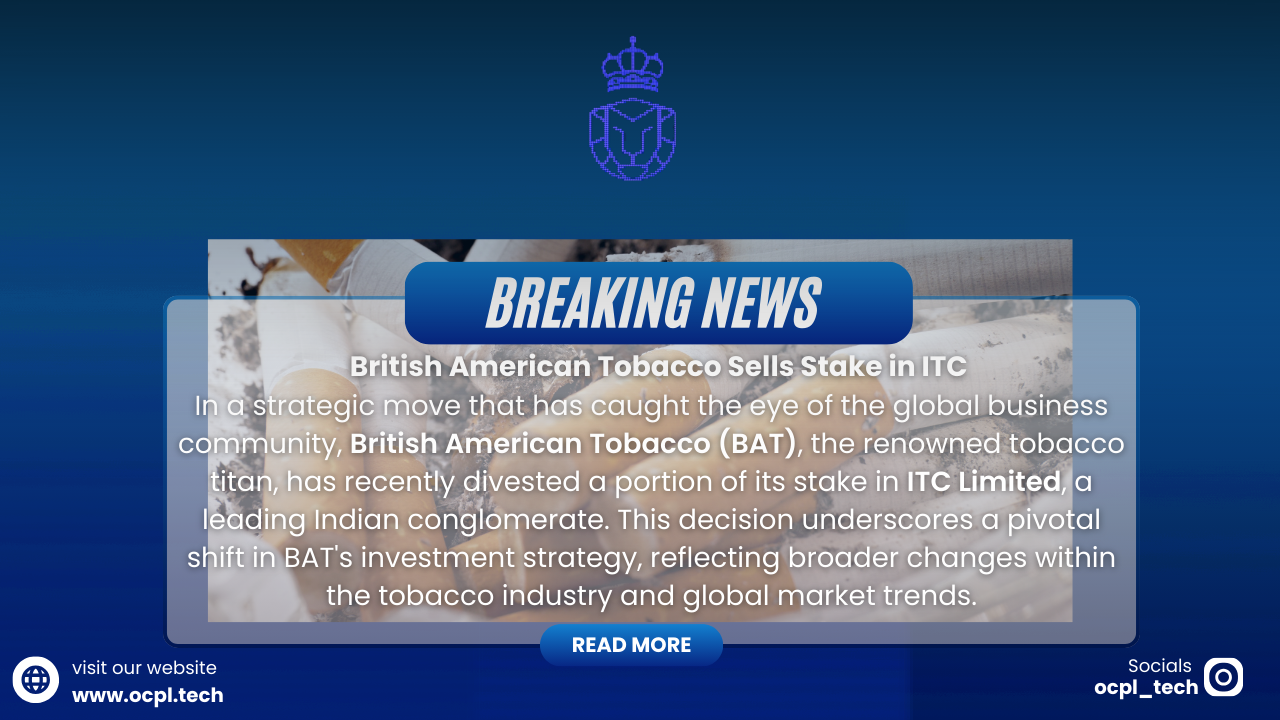
British American Tobacco Sells Stake in ITC: A Strategic Shift
In a strategic move that has caught the eye of the global business community, British American Tobacco (BAT), the renowned tobacco titan, has recently divested a portion of its stake in ITC Limited, a leading Indian conglomerate. This decision underscores a pivotal shift in BAT's investment strategy, reflecting broader changes within the tobacco industry and global market trends.
Introduction
The sale of BAT's stake in ITC Limited marks a significant moment in the corporate landscape, impacting stakeholders and the market at large. ITC Limited, with its headquarters in Kolkata, India, is a behemoth with interests spanning tobacco, consumer goods, hospitality, and agribusiness. Known for brands like Gold Flake, Sunfeast, and Classmate, ITC has long been a staple of the Indian economy.
ITC Limited: An Overview
ITC's diverse portfolio encompasses a range of sectors, making it a conglomerate of significant economic influence in India. Its operations extend beyond traditional tobacco products to include fast-moving consumer goods (FMCG), luxury hotels, and sustainable agribusiness initiatives, highlighting the company's adaptability and innovative approach to business.
BAT's Strategic Divestment
Reasons Behind the Sale
BAT's decision to sell its stake in ITC is multifaceted, driven by several strategic considerations:
- Portfolio Optimization: BAT aims to refine its global investment portfolio, focusing more acutely on its core operations and areas with potential for high growth.
- Industry Evolution: The tobacco sector is experiencing rapid transformation due to regulatory shifts, growing health awareness, and changing consumer preferences. This move allows BAT to navigate these changes more effectively.
- Capital Reallocation: Selling the stake in ITC enables BAT to free up capital for reinvestment in ventures with promising returns or to bolster its financial health.
Implications for ITC and the Indian Market
This transaction has broad implications, affecting not just the involved parties but also the wider market:
- Increased Independence for ITC: The reduction of BAT's stake offers ITC greater leeway to pursue its strategic goals without the oversight of a dominant foreign investor.
- Market Volatility: ITC's share price may see volatility as the market adjusts to this new reality. The move could influence investor sentiment and prompt a reevaluation of ITC's stock.
- Strategic Reassessments: Both BAT and ITC may undertake strategic reassessments post-transaction. BAT's portfolio refinement and ITC's potential pivot towards its non-tobacco segments could redefine their market positions.
The Road Ahead
Navigating Future Challenges
As BAT recalibrates its investment strategy, ITC stands at a crossroads, poised to further diversify its business model. The focus on FMCG, hospitality, and agriculture presents opportunities for growth and innovation.
Strategic Opportunities
For ITC, this moment is an opportunity to assert its independence and strategic vision. It can capitalize on its strong brand presence in India to deepen its market penetration and explore new growth avenues.
Investor Watch
The investment community will closely monitor how this divestment affects ITC's performance and BAT's strategic moves. The implications of this decision will unfold over time, influencing stock valuations and investor strategies.
Conclusion
The sale of BAT's stake in ITC is a landmark event that signifies the evolving dynamics of the global tobacco industry and the strategic imperatives of major corporations. It highlights the necessity for companies to adapt to changing market conditions, regulatory landscapes, and consumer preferences. As ITC embarks on its next phase of growth, free from the constraints of its previous association with BAT, the company faces both challenges and opportunities. The corporate and investment worlds will be keenly watching this transition, assessing its impact on the broader economic and market trends. This move is not just a transaction but a signpost of the shifting paradigms in global business strategy.